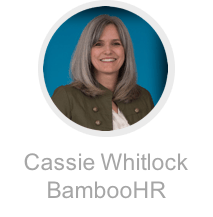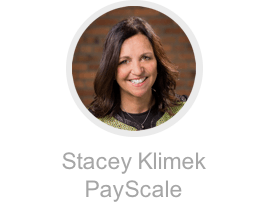What Is Strategic HR & How To Achieve It
The first step to learning any new concept is to define it. So, let’s define an important question that many organizations are now asking: what is strategic HR? what does it mean to shift from administrative HR to strategic HR? The long answer to this question would take reading 75 percent of all the articles on the BambooHR blog. Thankfully, a panel of HR experts, including Cassie Whitlock of BambooHR, Stacey Klimek of PayScale, and Adrienn Hopkins of Prezi, gave a more concise answer in a recent webinar.
Strategic HR Management—What, Who, How, and Why
Here are a few insights from the webinar to help HR generalists and other HR professionals learn from these panelists’ decades of HR experience, framed in their panel responses.
What do you believe are the key elements of an organization that HR can and should focus on?
Stacey
“The mission of our people team is to build and support high-performing teams…it’s ensuring that you’re providing your HR teams with a narrative that they can perpetuate and communicate that is consistent across the company.”
Cassie
“Managers are…focused on the people that report to them, but they’re also focused on the function of that job and getting that taken care of…HR’s main purpose is to focus on the growth of the organization by focusing on the people within the organization.”
Adrienn
“Having different locations—especially on different continents—exposes us to different talent pool challenges when it comes to hiring. You have to take into consideration what talent pool is available…how you can capture that audience, and how you can make your company brand attractive, while, at the same time, retaining your current workforce.”
How do you become an expert on these key elements of HR in your own organization?
Cassie
“Don’t just be an expert—be an expert in your company. Be sure that you’re spending time with your leaders in their departments working on the problems they’re trying to solve.”
Stacey
“It’s really important to focus on building relationships across the organization. Position yourselves as trusted advisors. Position yourselves as strategists. Ask your executives what you can do to support them.”
Adrienn
“Understanding the dynamics and those pain points, not just on the executive level, but also on the operational level as well, has been extremely helpful for us develop a higher level of leadership at the strategic level.
Be the change that your organization is going through.”
What strategies do you have for HR professionals hoping to build their organization’s employer brand?
Cassie
“First of all, do you have a compelling WHY to your organization? Think about your mission, vision, and values in your organization…Don’t just think about hiring, think about your employee experience from beginning to end.
If you asked your employees to run your employer brand program, would they believe in it?”
Stacey
“Word of mouth really is the most important thing. If you build that internal brand and focus on retaining the talent you worked so hard to hire, it translates into the external brand as well.”
Adrienn
“One of the key elements is finding the best way to phrase and tell the story of your brand. What is the experience you want to offer your employees? Who do you want to hire?”
How can HR professionals better demonstrate the value they bring to the entire organization?
Cassie
“When I bump up against the feeling that my work isn’t making a difference, and I step back and look at what’s going on. I find I’ve siloed my thinking, I’ve siloed my process as an on-the-side, bolt-on, add-on product within the organization rather than really being aligned to getting the work of the business done. Bring solutions, not just problems.”
Stacey
“Have a strong point of view. You and your team are working closely with employees every single day. Don’t be afraid to share your story, the WHY behind the data. It’s really important to have data to drive decisions but know the story of how that data is determined.”
What knowledge, skills, and capabilities will HR leaders need over the next five years?
Adrienn
“Make sure that you understand business, the goals, the direction, you understand how your organization is built up, you understand the product, and the challenges your company is facing.”
Cassie
“Data is at the core. The HR opportunity is translating data into beautiful communication: stories, employee experiences, something that is a differentiator in your market.”
Stacey
“Your CFO should be your best friend. If business is not your background, learn it.”
Listen On-Demand for More on Strategic HR Management
Hungry for more insights on strategic HRM? Access the full on-demand webinar here or read more on HR best practices. Knowing where to start and how to proceed can help make any HR generalist an essential contributor to their organization’s ongoing strategy.
Get caught up every month on all things HR. Don't worry, we promise we won't spam you.
Brian Anderson expertly decodes all things HR, drawing on a decade of technical writing in the business organization industry to provide editorial support to internal and external learning programs at BambooHR. His writing explores the different motivations that shape the employee experience and the psychology of human resources.















